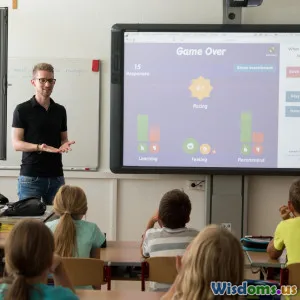
Study Smarter Not Harder Evidence Based Strategies for Exams
8 min read Discover proven, science-backed strategies to boost exam performance by studying smarter, not harder. (0 Reviews)
Study Smarter, Not Harder: Evidence-Based Strategies for Exam Success
Exams often evoke anxiety and long hours of relentless studying, but what if there was a better way? The idea of studying harder—more hours, more pages—is ingrained in many students’ minds. However, cutting-edge cognitive research suggests that studying smarter leads to improved retention, understanding, and exam performance. This article dives into evidence-based techniques designed to maximize your learning efficiency, reduce wasted effort, and ultimately help you excel on exams.
Understanding Why Traditional Study Methods Fail
Before exploring smarter methods, it’s important to recognize why many conventional approaches stumble. Passive reading and last-minute cramming are common yet ineffective habits. They generate an illusion of learning but offer limited long-term knowledge retention.
For example, studies by psychologist Jeffrey Karpicke reveal that simply re-reading text has a weaker effect on memory compared to actively retrieving information. This phenomenon, known as the "testing effect," underscores active recall’s superiority. Also, cramming creates a fragile layer of memory that fades quickly, leading to poor exam recall days later.
Spaced Repetition: Timing Is Key
One of the most powerful strategies is spaced repetition—distributing study sessions over increasing intervals.
What is Spaced Repetition?
Spaced repetition leverages the brain’s natural forgetting curve discovered by Hermann Ebbinghaus. Instead of massed practice, breaking your study over time forces your brain to reconstruct information repeatedly, strengthening memory traces.
Evidence and Application
Research consistently shows that spaced repetition improves long-term retention. For instance, a meta-analysis in Psychological Science (2016) found spacing out study sessions can improve recall performance by over 20% compared to massed study sessions.
Popular tools like Anki and Quizlet use spaced repetition algorithms to schedule flashcards for optimal review. Consider creating flashcards or summaries you revisit days and weeks apart to solidify understanding.
Active Recall: Learning by Testing Yourself
Active recall involves stimulating your memory through self-quizzing rather than passively reviewing notes.
Why It Works
Engagement in active retrieval forces deeper cognitive processing, reinforcing neural pathways.
Practical Tips
- After reading a chapter, close the book and write down everything you remember without looking.
- Use practice exams or question banks aligned with your syllabus.
- Recite key points aloud from memory.
John Dunlosky’s 2013 study highlights active recall as one of the highest utility study techniques, outperforming passive reading and highlighting.
Interleaving: Mixing Topics for Better Mastery
Contrary to the intuition of focusing on one topic for hours, interleaving encourages switching between multiple subjects or problem types in a study session.
How Interleaving Helps
Switching tasks prevents mental fatigue and promotes discrimination skills. This technique aids your brain in learning not just facts but how to decide which problem-solving approach to apply.
Example
Instead of completing twenty math problems on algebra alone, mix some geometry and calculus problems within the same session.
A 2014 study in Psychological Science showed students using interleaving scored significantly higher on tests than those who studied in blocked (single-topic) formats.
Elaborative Interrogation and Self-Explanation
Another approach involves explaining concepts aloud or asking “why” questions.
Why It’s Effective
This method helps deepen understanding by linking new knowledge to existing frameworks—critical for complex subjects like biology or history.
How To Practice
- After reading a fact or formula, ask: “Why is this true?” or “How does this connect with what I know?”
- Summarize topics in your own words and teach them to someone else or even pretend to teach.
Dr. John Dunlosky notes elaborative interrogation as a moderate utility technique that strengthens meaningful learning.
Sleep and Nutrition: The Overlooked Study Partners
No study technique reaches full potential without adequate rest and nutrition. The brain consolidates memories during sleep, making a good night’s rest essential after heavy studying.
Scientific Support
A 2013 study in Nature Neuroscience demonstrated that subjects who napped after learning performed 20% better on recall tests than those who didn’t.
Similarly, proper hydration and a balanced diet rich in omega-3 fatty acids support cognitive function, memory retention, and concentration.
Creating Effective Study Sessions: Practical Workflow
Integrate the strategies above with this example cycle:
- Pre-study Assessment: Quickly quiz yourself on topic to identify gaps.
- Spaced study blocks: Focused sessions of 25-35 minutes using Pomodoro technique.
- Active recall exercises: Use practice questions or flashcards.
- Interleaved review: Mix different subjects within or between sessions.
- Elaborate understanding: Ask why and teach concepts aloud.
- Review schedule: Plan subsequent reviews spaced over days.
Real World Success: Insights from Top Performers
- Richard Feynman, Nobel Laureate Physicist: Famously emphasized the power of teaching concepts to grasp complex ideas.
- Barbara Oakley, Engineering Professor: In her book A Mind for Numbers, she champions spaced repetition and focused vs. diffuse thinking modes.
- High school and university students worldwide have reported significant improvement using these techniques, doubling recall rates and reducing study hours.
Conclusion: Learn Smarter, Win Easier
Studying for exams doesn’t have to be an exhausting marathon of passive review. Techniques grounded in cognitive science—spaced repetition, active recall, interleaving, and elaborative interrogation—equip you to retain knowledge more efficiently and meaningfully. Weight them with proper sleep and nutrition, and you’ll transform not only exam performance but lifelong learning. Implement these evidence-based strategies today, and trade frantic hours for focused, high-impact study sessions that truly stick.
"The key is not to prioritize what’s on your schedule, but to schedule your priorities." – Stephen Covey
Start prioritizing effective study methods now, and experience the smarter way to succeed.
Rate the Post
User Reviews
Popular Posts



















